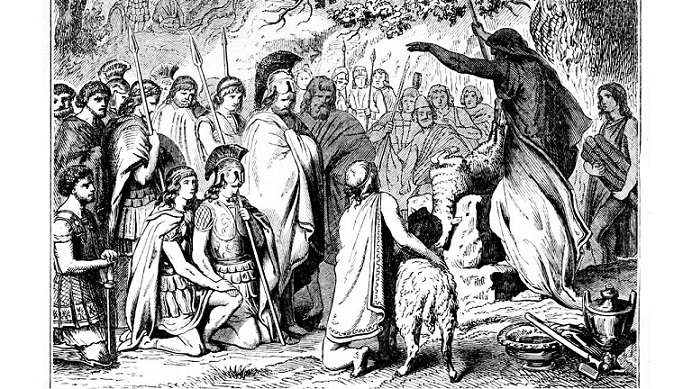This is the day for manifesting soul
To flesh, for making contemplation real;
Incorporeal yet real and whole
Advancing to some heavenly ideal.
Not such transcendence as annuls the Earth
Or disregards Creation as a dream.
We live awhile, then fall into our birth
Past death into a luminescent beam.
While we are blest with life we should aspire
To work for good, to love, not just observe;
To treasure mercy, always to inspire.
Not just to hunt and gather but to serve.
Our time on Earth is not for us alone
Our acts are what we are. Not what we own.
Brian Yapko is a lawyer who also writes poetry. He lives in Santa Fe, New Mexico.















Brian, I have to confess I struggled with the sense of the opening octet. But the closing sestet is magnificent indeed, filled with original phrases that are near-Miltonian in the clarity of its their moral imperatives. I am particularly taken with
“Not just to hunt and gather but to serve.”
and the closing couplet:
Our time on Earth is not for us alone
Our acts are what we are. Not what we own.
It is truth framed in beauty. Nice.
The sestet (which is a near perfect poem by itself) is also a message that well-captures the raison d’etre of Boxing Day (today); a day set aside In the British Commonwealth to remember those who serve us and provide an occasion to say “Thank you” to them.
Thank you, James. I appreciate the criticism. The octet was aiming for something metaphysical but landed a little short. I’m glad you liked the sestet. I’m a big believer in service but it’s not something that’s easy to convey without sounding preachy.
Dear Brian Yapko,
This is a graceful treatise on what we should always be doing, Boxing Day or no. The kind of poet I am speaks to the heart of a poem; investigates it and then respond. I cannot concern my self with the warts and limps when the message is strong.
I am a simple poet, and your poem spoke to me. Thank you.
Thank you for your kind comment, Sally!
Dear Brian,
“A thing of beauty is a joy forever”. John Keats knew whereof he spoke and must have written that line for you. Your opening octet was itself a “luminescent beam” as was this sonnet as a whole. Please continue with your gorgeous writing. We are all the better for it.
Thank you for your kind comment, Laura!
That’s a beautiful poem and I love every part of it, thank you.
Thank you for your kind comment, Yael!
Oh, Brian, thank you for the uplifting of our gaze from this troubled earth. Beautiful work. I don’t know or aspire to octets, etc., just clear, beautiful pictures of concepts. You nailed it.
Thank you very much, Cerise!
Just what does a picture of a concept look like, Cerise? And exactly what kind of nails do you use to pin things down?
You made some very good points, Brian, and generated some rather deft phrases, but in the end and as a whole, the poem was the essence of vacuity. The second half of the second stanza should serve as a prime example of what I am writing about just now — a flabby idea not grounded in any coherent reality. I understand the elation of the poet who strings felicitous expressions together, but that’s not the same thing as expressing a clear idea. Don’t worry. I have overreached many times in this dimension myself. Dot your “I”s, cross your “T”s, and be as exact and as exacting as you possibly can.
I always appreciate your criticism and will take it to heart. Thank you.
Think and grow — that’s all I ask.